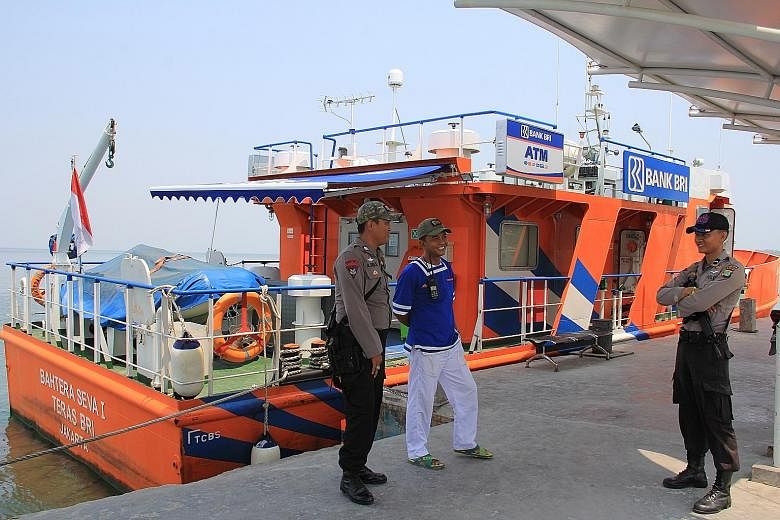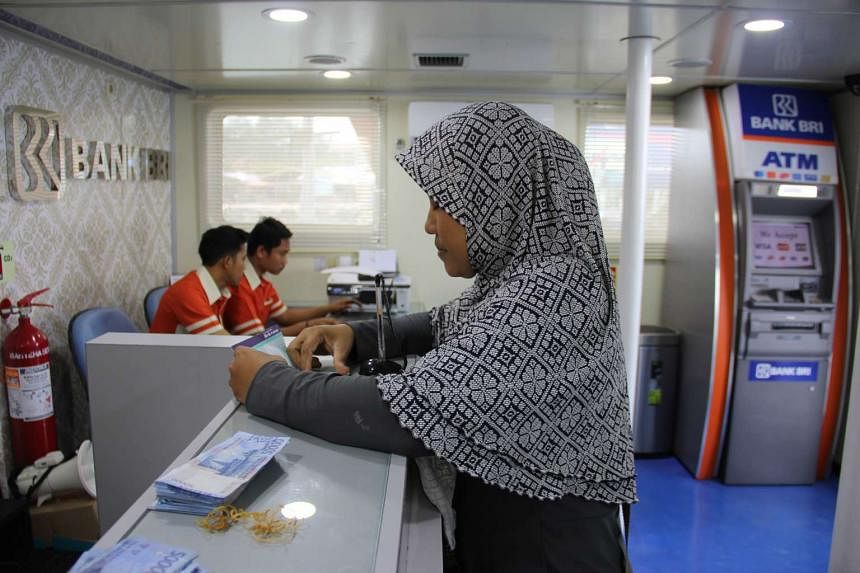Madam Ningsih, who goes by one name, used to have to take a 20-minute boat ride from Untung Jawa to mainland Java whenever she needed to do some banking. These days, the bank comes to her.
"Every Monday, I wait for the boat to arrive. Today, I am depositing 52 million rupiah I'm saving up for my haj (pilgrimage)," the 35-year-old, who runs a homestay and also sells clothes, told The Straits Times. The sum is about S$5,200.
The floating bank is the brainchild of Bank Rakyat Indonesia (BRI), which wants to offer banking and loan services to residents on remote islands belonging to the Thousand Islands province, north of Jakarta. It is staffed by a teller, two bank officers and a manager who work in a small air-conditioned cabin. There is also an ATM.
For islanders like Madam Ningsih, the floating bank is a vital link to the rest of Indonesia. As for the state-owned bank, what it is doing helps bolster President Joko Widodo's idea of strengthening the country's maritime sovereignty.
"Indonesia is a sprawling archipelago and we thought that having a boat go round some of the remote islands would reach out to islanders without access to banking facilities and also help some local businesses," said Mr Ferdinand R. Tahamata, BRI's assistant manager of micro-business.
South-east Asia's largest economy is home to 250 million people who are spread out across at least half of its 17,000 islands. Seven in 10 people do not have a bank account.
In the early 2000s, BRI was the first Indonesian bank to come up with the idea of "mobile banks", sending vans to remote villages and districts to offer banking services to some 50 million people. It now has a fleet of more than 500 "mobile banks".
Now, several local banks have followed suit to offer similar van-banking facilities.
BRI is also the world's largest micro-lender with more than 10,000 branches and 127,000 staff.
"Part of the reason we're testing it out in Thousand Islands is that this is a group of islands near the capital (Jakarta) which has many small business owners who offer homestays and boat rentals to tourists," said its vice-president of micro-banking, Mr Erma S. Putra
The boat is painted bright orange with a dash of blue, BRI's corporate colours. If deemed successful, he said BRI plans to launch a boat - costing some 15 billion rupiah - every year to sail through the eastern seas of Indonesia and serve Ternate in Maluku island, Bau Bau in Sulawesi island, as well as sail its northern seas to reach Tanjung Selor in North Kalimantan.
The six islands that it makes stops at - Untung Jawa, Pramuka, Panggang, Kelapa, Harapan and Tidung - are popular short-stay destinations. Snorkelling is popular because of their clear waters.
At Untung Jawa, food vendors line the beach, squeezed in between stalls offering sea sports.
Since the floating bank was launched in April, it has helped islanders open 220 new bank accounts, said Mr Tahamata. About 8,000 residents, mostly traders, fishermen and civil servants, live on the islands.
The floating bank is open from Mondays to Fridays, between 8am and 3pm. The ATM is open until 9pm. The only difference is that it serves different customers on different islands daily. On Friday, the boat returns to Jakarta, often with deposits of as much as 400 million rupiah, according to the bank.
The 120-tonne vessel has 11 people who work and stay on board. Apart from the four bank employees, the others are the boat's captain, a cook, two policemen and three boat crew. The bank staff are rotated every week.
Working on the boat has its rewards for the employees.
Bank teller Asep Imam said he finds the sound of waves relaxing.
His colleague, customer service officer Pancar Haryono, said: "After a hard day's work, we look forward to taking a dip in the sea or snorkelling. That makes up for being away from our family."


